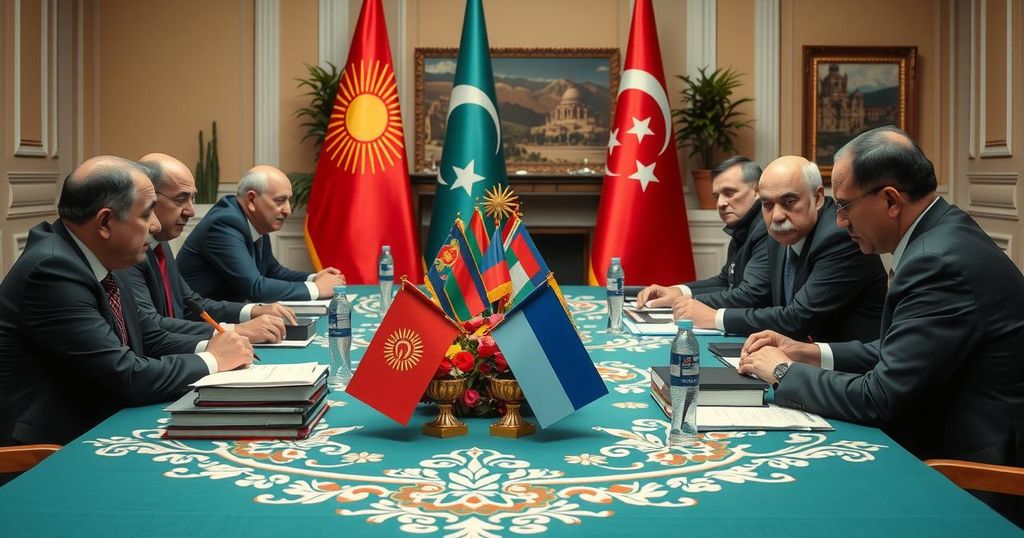Conflicts
Politics
ABDUL, ABDULLA ARIPOV, AD, ADYLBEK KASYMALIYEV, ASIA, CABINET OF MINISTERS, CENTRAL ASIA, CLIMATE, FAMILY LEGACY, FE, FERGHANA, FERGHANA VALLEY, INTERNATIONAL RELATIONS, JAPAN, KO, KYRGYZ, KYRGYZSTAN, REFUGEE CRISIS, SHAHIMARDON, SO, SOH, TAJIK, TAJIKISTAN, USSR, UZBEKISTAN, VO, VORUKH, WAR
Sophia Klein
Historic Meeting of Kyrgyz, Tajik, and Uzbek Leaders Signifies New Era of Cooperation in Central Asia
On January 8, the prime ministers of Kyrgyzstan, Tajikistan, and Uzbekistan met for the first time to address significant regional issues, including border delimitation and hydropower cooperation. This meeting, catalyzed by prior conflicts, represents a crucial step in fostering regional dialogue and addressing disputes that have hindered development in the Ferghana Valley, a region integral to Central Asian agriculture and trade.
In a historic first, the leaders of Kyrgyzstan, Tajikistan, and Uzbekistan convened on January 8 to discuss a series of pressing issues pertinent to their nations. Prime Minister Kohir Rasulzoda of Tajikistan, Prime Minister Abdulla Aripov of Uzbekistan, and the Chairman of Kyrgyzstan’s Cabinet of Ministers, Adylbek Kasymaliyev, gathered at the tri-border area, where discussions highlighted the finalization of border delimitation between Uzbekistan and Kyrgyzstan, as well as the agreement regarding the Kyrgyz-Tajik border set for December 2024.
The region has experienced conflicts stemming from unresolved border delineations since the collapse of the Soviet Union, an outcome of borders introduced by Soviet authorities that later came to signify more profound national disputes. Voices for peace reiterated the importance of addressing issues of water usage and the management of hydropower resources, as these are pivotal not only for energy supply but also for sustaining agriculture in one of Central Asia’s most populous regions.
As climate challenges progress, the need for cooperation in hydropower generation becomes increasingly significant to alleviate the electricity shortages faced by all three countries. Additionally, with Central Asia’s role as a vital trade corridor linking Europe and China, logistical cooperation emerged as a key agenda point during the assembly.
The meeting itself marks a pivotal step forward in regional diplomacy, as previous encounters had been scarce and fraught with tension. The January 8 meeting was catalyzed partly by previous conflicts at the Kyrgyz-Tajik border, demonstrating a collective willingness to foster dialogue and build trust amongst nations that historically have maintained closed borders. This unprecedented summit could pave the path for further high-level meetings, potentially transitioning the Ferghana Valley from a hotspot of contention to one of collaboration and unity.
The Ferghana Valley, a crucial area in Central Asia, has been the center of geopolitical tensions since the dissolution of the Soviet Union. Borders delineated by Soviet mapmakers have led to disputes regarding territory ownership, particularly in agricultural contexts. The region has struggled with violence arising from unmarked borders, often resulting in loss of life and heightened animosities among border communities. This meeting represents a significant shift in addressing these longstanding issues and fostering cooperation on vital resources such as water and electricity.
The meeting on January 8 amongst the prime ministers of Kyrgyzstan, Tajikistan, and Uzbekistan marks a watershed moment in Central Asian relations. With concrete steps towards resolving border issues and collaborative discussions on hydropower and trade, there exists a potential shift towards a more harmonious future for the Ferghana Valley. The necessity of ongoing dialogue and mutual understanding cannot be overstated as these nations strive for peace and stability in a historically divided region.
Original Source: timesca.com








Post Comment